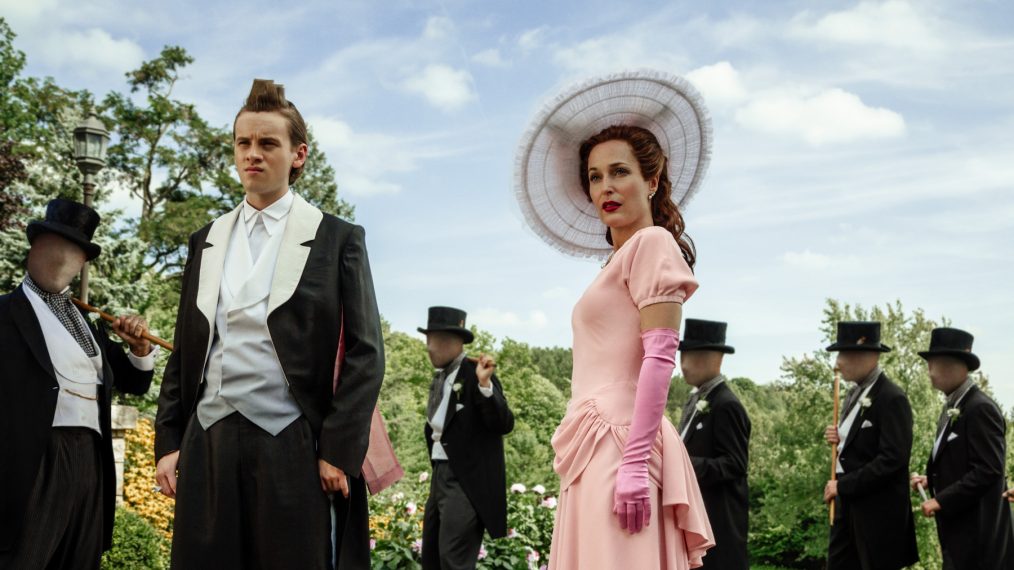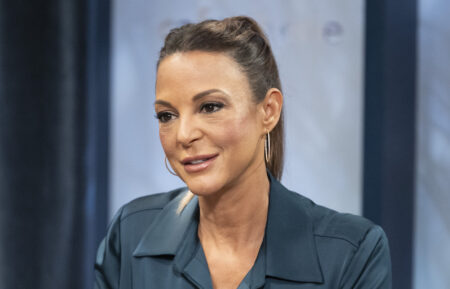Meet ‘American Gods’ Mr. Wednesday, Mad Sweeney and Bilquis

[Spoiler Alert! This post contains spoilers for the season premiere of American Gods.]
American Gods, in all the splendor of its blood and guts and lust, gives embodiment to the global influences of America. The old gods in the Starz adaptation of Neil Gaiman’s novel, threatened by the paradigm shifts of newer forces like Technical Boy (Bruce Langley) and Media (Gillian Anderson), came to America from around the world with the people who once worshipped them. Some of the show’s old gods are obvious references to well-known deities, while others are more obscure nods to less familiar folklore.
This weekly list will break down the gods introduced on each episode and get into a little bit of detail about the mythologies they’re based on. Sunday’s season premiere introduced viewers to their first three old gods: Mr. Wednesday (Ian McShane), Mad Sweeney (Pablo Schreiber) and Bilquis (Yetide Badaki).
Mr. Wednesday
The first, and so far most important, god to make an appearance on the show is Ian McShane’s Mr. Wednesday, who is based on Odin (aka Woden), the All-Father of Norse mythology. Odin takes on the “Wednesday” moniker because, as he mentions when he introduces himself to Shadow Moon (Ricky Whittle), it’s his day. The modern word for Wednesday comes from the Old English “Wōdnesdæg,” which translates to “Odin’s day.”
Odin is the god of lots of things in Norse myths, but some of his greatest mythological hits involve the sacrifices he makes in pursuit of knowledge. One of Odin’s defining features, which Mr. Wednesday makes reference to, is that he only has one eye. According to Norse myth, he plucks out the other as the price for drinking from a well of knowledge.
In his most intensive study session, Odin stabs himself with his own spear and hangs himself from one of the branches of the world tree, Yggdrasil, for nine days. All of this is to convince the Norns (beings similar to the Fates of Greek myth) to teach him about the runic alphabet. This myth of a self-imposed hanging is why Odin is also known as the god of the gallows.
Germanic peoples of the early Middle Ages would make human sacrifices to Odin via hanging, in recognition of Odin’s ordeal. All the hanging and noose symbolism surrounding Shadow Moon in the premiere, aside from being an uncomfortable reminder of America’s racially charged history of lynching, is connected to the ritual of Odin’s hanging.
Mad Sweeney
Mad Sweeney requires perhaps the least interpretation of the three gods introduced in the premiere. When Shadow Moon asks who he is, Sweeney offers up the straightforward explanation that he’s a leprechaun. He seems to have enough magically produced gold to prove it, even though he’s a little bit tall for the role.
The name Mad Sweeney comes from a piece of medieval Irish literature called “Buile Suibhne.” In the story, a king named Suibhne (aka Sweeney) is cursed to a life of wandering in madness after he kills a monk with a spear. Combining the literary background of “Buile Suibhne” and leprechaun folklore into one character makes Sweeney into a representation of the broad strokes of Irish cultural identity, complete with a generous streak of the rowdy drunk stereotype.
Bilquis
It isn’t clear yet how Bilquis fits into the scheme of things with Shadow Moon and Mr. Wednesday, but she sure does make a strong first impression. Even in the instant-gratification age of Tinder, a girl needs to be pretty charming to convince a guy to go for full vaginal absorption on the first date.
The name Bilquis is a reference to the story of the Queen of Sheba, who factors into the mythologies and religious texts of Christian, Jewish, Arab and African cultures, among others. In some variations of the story, primarily Jewish, the Queen of Sheba is likened to the biblical demon Lilith, but in others, she is simply a powerful queen who appears in the court of King Solomon to offer gifts.
Like Sweeney, the Bilquis on American Gods is a character built more from an amalgamation of ideas than a singular point of reference. There are elements of the demonic temptress character, without a doubt, but there are also hints of a more general African fertility goddess at play, and more elaboration is sure to come.










